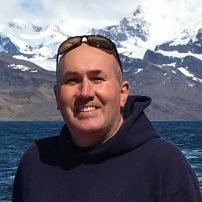
Overview
Ocean acidification and the warming of Arctic waters together with increased light penetration following ice-retreat all have consequences for the production of trace gases (e.g. methane, nitrous oxide, carbon monoxide, and dimethyl sulphide) that influence the climate.
- At what rate are these gases being produced in the surface of the Arctic Ocean now?
- How will the processes that control their production respond to further change?
- Will the ocean-atmosphere exchange of these gases change over the next century?
PETRA will develop ecosystem models to identify the main controls on trace gas production in the contemporary and future Arctic Ocean.
This project is co-funded by the German Federal Ministry of Education and Research and by UKRI NERC.
Dr Andrew Rees, lead investigator of the PETRA project:
PETRA is the result of a fantastic opportunity for teams from Plymouth Marine Laboratory in the UK and GEOMAR in Germany to work together on an issue that is recognised as critical by international experts. We will use state of the art experimental approaches and computer modelling to investigate how environmental changes in the Arctic Ocean are affecting the atmospheric content of gases which play a large part in controlling our climate.
Lead Investigators
-
 View full profile
View full profileDr Andrew Rees
Co-lead investigator, Plymouth Marine Laboratory
Andy Rees is a senior biogeochemist at Plymouth Marine Laboratory (PML) and, with Hermann Bange, is the lead investigator of the PETRA project. My research interests revolve around the biological cycling of nutrients and the flux of greenhouse gases in estuarine, coastal and oceanic waters. I use state of the art analytical instrumentation and procedures to investigate the impact of natural and anthropogenic factors on biogeochemical cycles and on the exchange of trace gases between water and atmosphere.
-
 View full profile
View full profileProfessor Dr Hermann Bange
Co-lead investigator, GEOMAR
Hermann Bange leads the Trace Gas Biogeochemistry group at the GEOMAR in Kiel, Germany, and is a co-lead investigator in the PETRA project. Within PETRA, Hermann coordinates the contribution of GEOMAR which include measurements of DMS/P/O and CO as well the participation of PETRA in the R/V Polarstern cruise PS114 to the Fram Strait in July/August 2018.
Related Articles
-
Arctic study to shed light on organisms key to the food chain
A research team – led by a University of Stirling expert – will set off on a scientific cruise to the Arctic Ocean this weekend in a bid to understand the behaviour of tiny organisms that are key to the food chain. Read more
04 August 2019 -
Impacts of ocean acidification on commercial fish stocks
Dr Carol Turley, a marine expert, says it is necessary to investigate the effects of acidification because of uncertainties about the impact on the marine environment and on commercial fish stocks. Read more
10 October 2018

